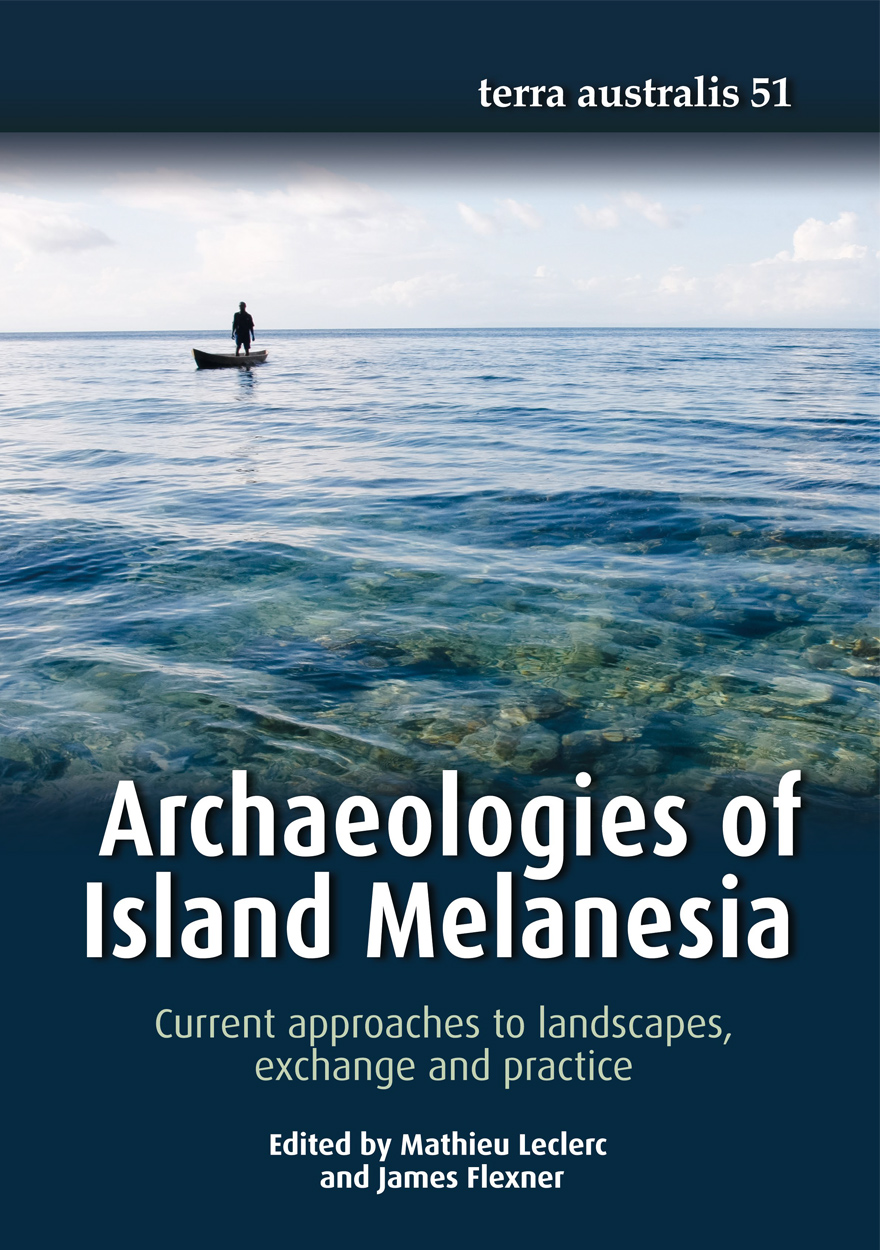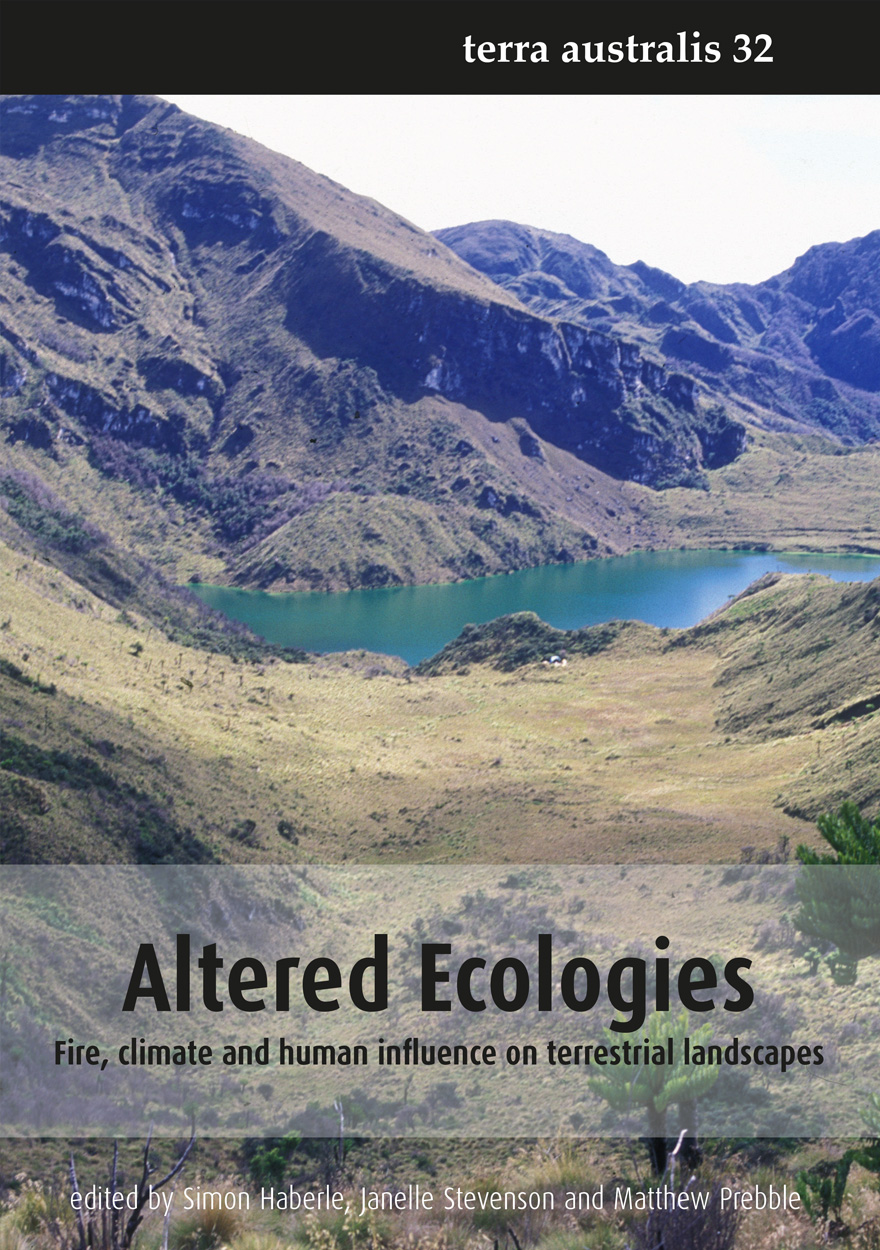Search titles
Displaying results 1 to 9 of 9.

Archaeologies of Island Melanesia »
Current approaches to landscapes, exchange and practice
Edited by: Mathieu Leclerc, James Flexner
Publication date: August 2019
‘The island world of Melanesia—ranging from New Guinea and the Bismarcks through the Solomons, Vanuatu, and New Caledonia—is characterised more than anything by its boundless diversity in geography, language and culture. The deep historical roots of this diversity are only beginning to be uncovered by archaeological investigations, but as the contributions to this volume demonstrate, the exciting discoveries being made across this region are opening windows to our understanding of the historical processes that contributed to such remarkably varied cultures. Archaeologies of Island Melanesia offers a sampling of some of the recent and ongoing research that spans such topics as landscape, exchange systems, culture contact and archaeological practice, authored by some of the leading scholars in Oceanic archaeology.’
— Professor Patrick Vinton Kirch Professor of Anthropology, University of Hawai‘i
Island Melanesia is a remarkable region in many respects, from its great ecological and linguistic diversity, to the complex histories of settlement and interaction spanning from the Pleistocene to the present. Archaeological research in Island Melanesia is currently going through a vibrant phase of exciting new discoveries and challenging debates about questions that apply far beyond the region. This volume draws together a variety of current perspectives in regional archaeology for Island Melanesia, focusing on Vanuatu, the Solomon Islands, New Caledonia and Papua New Guinea. It features both high-level theoretical approaches and rigorous data-driven case studies covering recent research in landscape archaeology, exchange and material culture, and cultural practices.

Large-scale Mines and Local-level Politics »
Between New Caledonia and Papua New Guinea
Edited by: Colin Filer, Pierre-Yves Le Meur
Publication date: October 2017
Despite the difference in their populations and political status, New Caledonia and Papua New Guinea have comparable levels of economic dependence on the extraction and export of mineral resources. For this reason, the costs and benefits of large-scale mining projects for indigenous communities has been a major political issue in both jurisdictions, and one that has come to be negotiated through multiple channels at different levels of political organisation. The ‘resource boom’ that took place in the early years of the current century has only served to intensify the political contests and conflicts that surround the distribution of social, economic and environmental costs and benefits between community members and other ‘stakeholders’ in the large-scale mining industry. However, the mutual isolation of Anglophone and Francophone scholars has formed a barrier to systematic comparison of the relationship between large-scale mines and local-level politics in Papua New Guinea and New Caledonia, despite their geographical proximity. This collection of essays represents an effort to overcome this barrier, but is also intended as a major contribution to the growth of academic and political debate about the social impact of the large-scale mining industry in Melanesia and beyond.

War and Other Means »
Power and violence in Houaïlou (New Caledonia)
Authored by: Michel Naepels
Publication date: October 2017
War and Other Means describes and analyses the practices of war, the ‘objects of war’ and the conventions of the use of violence in Houaïlou, New Caledonia. It focuses on the colonial repression conducted in 1856 and after, the anti-sorcerer hunt in 1955, the independence mobilisation in the 1980s and the village feuds in the 2000s. Through this archaeology of violence, it reports on the practical inventiveness, intelligence and cunning of the Kanaks involved in social, often violent, conflicts. The use of archival material and recourse to the oral stories gathered from the inhabitants of Houaïlou restores the depth of these historical moments and the nested contexts of the political action that unfolded; it also questions the value and limits of fieldwork investigation.
These episodes are moments of change in the social, administrative, land and political organisation of New Caledonia; they make it possible to understand, from France’s takeover to the present day, the real modalities of implementation of colonial and postcolonial governmentality. The attention given to the invention, the importation or the adaptation of repressive techniques, closely linked to the French experience in Algeria, opens up a geopolitics of colonisation. Through this detailed description of the social logics of conflict, Michel Naepels also invites us to reflect on the place of European fantasies on violence and on the representations of otherness.
For the French edition, Conjurer la guerre. Violence et pouvoir à Houaïlou (Nouvelle-Calédonie), published by Éditions de l’École des hautes études en sciences sociales, please visit editions.ehess.fr/ouvrages/ouvrage/conjurer-la-guerre

Tides of Innovation in Oceania »
Value, materiality and place
Edited by: Elisabetta Gnecchi-Ruscone, Anna Paini
Publication date: April 2017
Tides of Innovation in Oceania is directly inspired by Epeli Hau‘ofa’s vision of the Pacific as a ‘Sea of Islands’; the image of tides recalls the cyclical movement of waves, with its unpredictable consequences. The authors propose tides of innovation as a fluid concept, unbound and open to many directions. This perspective is explored through ethnographic case studies centred on deeply elaborated analyses of locally inflected agencies involved in different transforming contexts. Three interwoven themes—value, materiality and place—provide a common thread.

Watriama and Co »
Further Pacific Islands Portraits
Authored by: Hugh Laracy
Publication date: October 2013
Watriama and Co (the title echoes Kipling’s Stalky and Co!) is a collection of biographical essays about people associated with the Pacific Islands. It covers a period of almost a century and a half. However, the individual stories of first-hand experience converge to some extent in various ways so as to present a broadly coherent picture of ‘Pacific History’. In this, politics, economics and religion overlap. So, too, do indigenous cultures and concerns; together with the activities and interests of the Europeans who ventured into the Pacific and who had a profound, widespread and enduring impact there from the nineteenth century, and who also prompted reactions from the Island peoples. Not least significant in this process is the fact that the Europeans generated a ‘paper trail’ through which their stories and those of the Islanders (who also contributed to their written record) can be known. Thus, not only are the subjects of the essays to be encountered personally, and within a contextual kinship, but the way in which the past has shaped the future is clearly discernible. Watriama himself features in various historical narratives. So, too, certain of his confrères in this collection, which is the product of several decades of exploring the Pacific past in archives, by sea, and on foot through most of Oceania.

France in the South Pacific »
Power and Politics
Authored by: Denise Fisher
Publication date: May 2013
France is a Pacific power, with three territories, a military presence, and extensive investments. Once seen by many as a colonial interloper in the South Pacific, by the early 2000s, after it ended nuclear testing in French Polynesia and negotiated transitional Accords responding to independence demands in New Caledonia, France seems to have become generally accepted as a regional partner, even if its efforts concentrate on its own territories rather than the independent island states.
But France’s future in the region has yet to be secured. By 2014 it is to have handed over a set of agreed autonomies to the New Caledonian government, before an independence referendum process begins. Past experience suggests that a final resolution of the status of New Caledonia will be divisive and could lead once again to violent confrontations. In French Polynesia, calls continue for independence and for treatment under UN decolonisation procedures, which France opposes. Other island leaders are watching, so far putting faith in the Noumea Accord, but wary of the final stages. The issues and possible solutions are more complex than the French Pacific island population of 515,000 would suggest.
Combining historical background with political and economic analysis, this comprehensive study offers vital insight into the intricate history – and problematic future – of several of Australia’s key neighbours in the Pacific and to the priorities and options of the European country that still rules them. It is aimed at policy-makers, scholars, journalists, businesspeople, and others who want to familiarise themselves with the issues as France’s role in the region is redefined in the years to come.

Politics, Development and Security in Oceania »
Edited by: David Hegarty, Darrell Tryon
Publication date: April 2013
The chapters in this volume canvass political change and development across the Pacific Islands from a variety of perspectives, each contributing to the analysis of a region growing in complexity and in confidence. They fall neatly into three sections: Oceania and its Inheritance; Oceania – Current Needs and Challenges; and Oceania and its Wider Setting.
The new states of the Pacific have demonstrated considerable resilience, and in many cases, an extraordinary capacity to bounce back from difficulty and to maintain optimism for the future. The continuing professionalisation of public management across the region is building on that tradition. The growth of civil society organisations is also beginning to play a positive role in policy and implementation. Donors are becoming more coherent in their strategies, more attuned to the realities of generating development outcomes in small island states, and are beginning to acknowledge and map progress.
This book explores these themes of governance, development and security that signal both continuity and change in the Pacific’s pattern of islands.

Altered Ecologies »
Fire, climate and human influence on terrestrial landscapes
Edited by: S. Haberle, J. Stevenson, M. Prebble
Publication date: November 2010
Like a star chart this volume orientates the reader to the key issues and debates in Pacific and Australasian biogeography, palaeoecology and human ecology. A feature of this collection is the diversity of approaches ranging from interpretation of the biogeographic significance of plant and animal distributional patterns, pollen analysis from peats and lake sediments to discern Quaternary climate change, explanation of the patterns of faunal extinction events, the interplay of fire on landscape evolution, and models of the environmental consequences of human settlement patterns. The diversity of approaches, geographic scope and academic rigor are a fitting tribute to the enormous contributions of Geoff Hope. As made apparent in this volume, Hope pioneered multidisciplinary understanding of the history and impacts of human cultures in the Australia- Pacific region, arguably the globe’s premier model systems for understanding the consequences of human colonization on ecological systems. The distinguished scholars who have contributed to this volume also demonstrate Hope’s enduring contribution as an inspirational research leader, collaborator and mentor. Terra Australis leave no doubt that history matters, not only for land management, but more importantly, in alerting settler and indigenous societies alike to their past ecological impacts and future environmental trajectories.

Political Parties in the Pacific Islands »
Edited by: Roland Rich, Luke Hambly, Michael G. Morgan
Publication date: April 2008
While political parties remain an indispensable institutional framework for representation and governance in a democracy, the democracies of many Pacific Islands nations are undermined by the weakness and inefficacy of their local political parties.
Addressing the implications of the lack of established party systems across the Pacific, this collection seeks to illuminate the underlying assumptions and suppositions behind the importance of coherent and effective parties to overall democratic functioning.
Focusing on the political systems of East Timor, Papua New Guinea, Solomon Islands, Vanuatu, New Caledonia, Fiji and Samoa, the coherent structure of the volume makes it consistently useful as both an articulate analytical text and a reference tool concerning the political composition, history and direction of Pacific states.
Featuring contributions from scholars who are familiar names to even the most casual of Pacificists, Political Parties in the Pacific is the benchmark reference work on the political parties of the Pacific: an invaluable resource for students, scholars and researchers of the Pacific and international politics.



